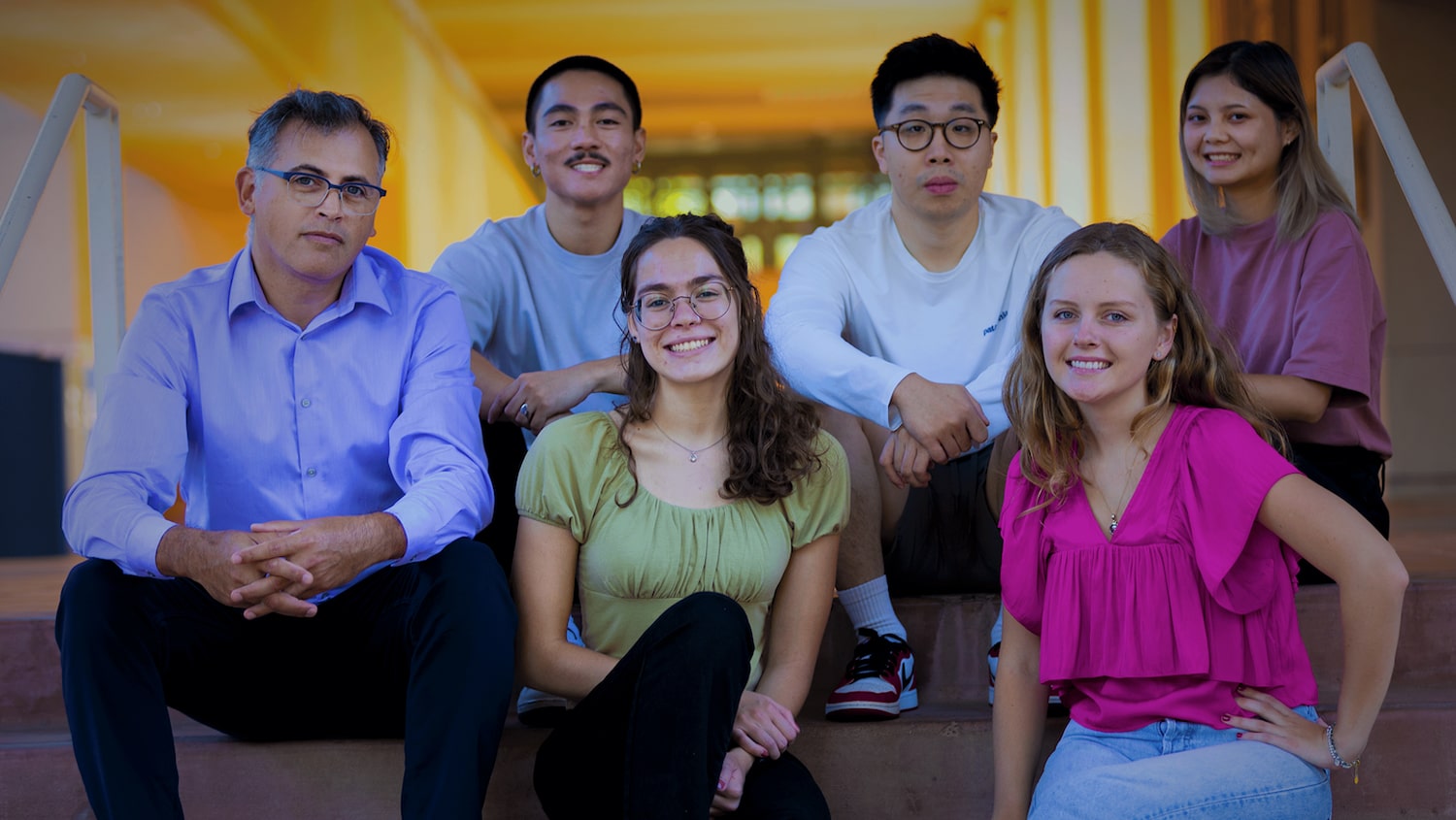Creative Sustainability

The Froot team, left to right, faculty advisor Javier de la Fuente, Fred Pastrana, Heather Lopez, Han Wong, Hannah Kraus and Thucmy Dang. Not pictured are Colter Pruyn and faculty advisors Irene Carbonell and Linh Dao.
After setting out to design a sustainable package for produce, an interdisciplinary team of Cal Poly students looked to other packages for inspiration – including beer carriers.
“Once we decided on a product, we started the process of creating prototypes and built about 10 to 15 completely different ideas before we found the right structure,” said Heather Lopez, an Industrial Technology and Packaging (ITP) student on the team. “We drew inspiration from beverage carriers and lunch boxes for the structure, citrus slices and fruit bowls for the shape, and natural and geometric designs for the aesthetics.”
The final design impressed both national and global judges as the team’s Froot carrier won second place in two different prestigious competitions.
The project began as a collaboration between Fiber-Based Packaging, an ITP class, and Graphic Design III, from the Art and Design Department. The team initially pursued a 2022 competition hosted by the Paperboard Packaging Alliance (PPA) before advancing to the WorldStar Global Packaging Awards. For the PPA contest, students were challenged to design new paperboard packaging and packaging components for an existing product that is currently packaged primarily in plastic.
The project was especially timely in California, where Gov. Gavin Newsom signed a law in June 2022 requiring all packaging in the state to be recyclable or compostable by 2032.

The Froot package features colorful graphics, holes so customers can see the actual product and a structural design that transforms it into a box. (Courtesy photo)
Cal Poly’s Froot team looked at fruits and vegetables, which are often sold in mesh bags and plastic containers that are not recyclable.
“Those will end up most likely in landfills,” said Javier de la Fuente, one of the team’s faculty advisors and chair of the ITP area in the Orfalea College of Business.
Beginning last winter, the team initially focused on mandarins, then limes and lemons. The packages entailed both structural and graphic designs, so a team was formed for each focus.
Ultimately, Lopez sketched out a design that combined several different ideas, including a distorted cube shape and a recessed handle.
“The day when we cut out our design on the prototyping table and saw it folded for the first time was such a fulfilling moment,” Lopez said. “After everything we went through with the designing process, we had an actual package that we were proud of and that worked.”
The package features colorful, welcoming graphics and holes so customers can see the product inside. Meanwhile, the structure, 100 percent recyclable, was designed so it is stackable, easy to carry and could also be converted to a bowl upon purchase.

The Froot team, left to right: Fred Pastrana, Thucmy Dang, Javier de la Fuente, Heather Lopez, Hanna Kraus and Han Wong.
“It was important to our team that Froot appealed to all of its audiences – whether that be the person that shipped the flats, the person that filled the package with fruit, the person that displayed the product on the grocery store shelves, or the consumer that would be bringing Froot home with them,” said Thucmy Dang, an engineering/industrial management graduate student. “We wanted to create something functional, something that stood out on a shelf, and something that would be environmentally friendly.”
There was other specific considerations, such as a structure design that allowed it to be flattened for easy shipment.
“For us, ease of manufacturing is important,” de la Fuente said.
The package had to be original, practical and, of course, sustainable.
“Because our project was intended to be marketable to industry professionals, we had to consider the production of our package, such as the cost, materials, and shipment, which opened my eyes to both the importance and the complexity of sustainability,” Lopez said. “It helped me realize that while phasing out single-use plastic packaging might seem like the answer to all our problems, there’s so much more to consider than just getting rid of plastic when its barrier properties are unnecessary.”

Froot packaging was designed for mandarins, lemons and oranges. (Courtesy photo)
Other members of the team included Colter Pruyn (consumer packaging), along with graphic design students Han Wong, Fred Pastrana, and Hannah Kraus. Other faculty advisors included Irene Carbonell (ITP) and Linh Dao (Art and Design).
During the PPA competition, the Froot team was one of three that advanced to the finals in Austin, Texas, this past fall, ultimately earning second place and a chance to compete at the WorldStar Global Packaging Awards – what de la Fuente referred to as “the World Cup of packaging” — where the team won second overall, along with a gold medal for marketing appeal and a bronze medal for sustainability.
The project was a quintessential Learn by Doing lesson.
“It introduced me to working with a dedicated design team on a project that has real world implications,” Lopez said. “Learning how to interact with team members, to communicate expectations, to divide work, and to practice accountability is crucial to preparing for industry work.”
For Dang, who earned a packaging minor as an undergraduate, the Froot project also provided lessons on sustainability.
“It has made me more aware of the impact I make on the world when I buy fruit packaged in nonrecyclable plastic,” she said. “Learning sustainability lessons like this raises awareness and pushes people to make choices that leave the Earth the way we found it!”
Giving supports students.
Our students benefit from the support of our friends and alumni in several ways. Please consider giving to the Orfalea College of Business.
